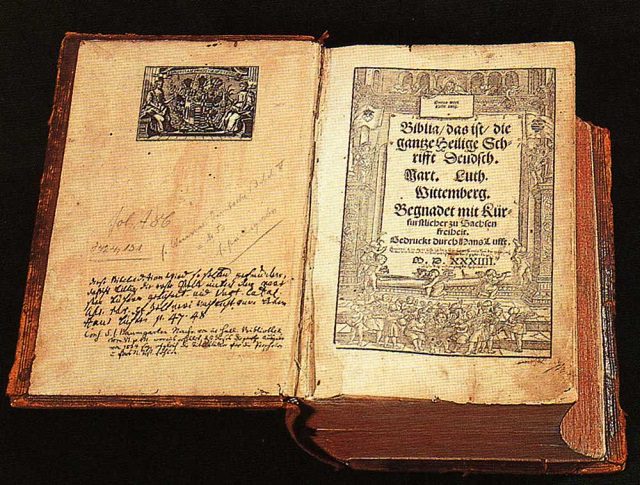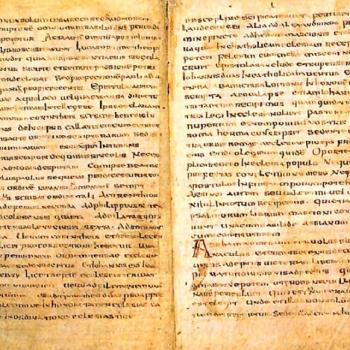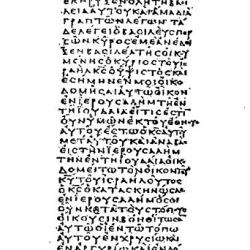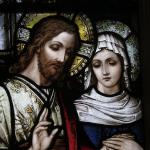Martin Luther’s German translation of the Bible; 1534 edition, from his house in Wittenberg, Germany [public domain /
Wikimedia Commons]
(6-5-10)
These remarks and dialogues occurred in a combox on the Reformed Protestant-dominated Green Baggins website (starting at comment #259). Paige Britton’s words are in blue, rfwhite‘s in green, Jeff Cagle’s in purple. The words of anti-Catholic polemicist Ron DiGiacomo (who entered the discussion blasting with the obligatory repeated personal attacks that I won’t bore readers with below and almost immediately became a parody of himself and of a lousy Protestant apologist), will be in red.
* * * * *
If the Catholic church merely affirms what has always been canonical, does this mean that the Apocryphal books have “always” been canonical (and “authored by God”) just like the rest of the OT & NT?
* * *
Of course, since from our perspective (in line with the Septuagint and the early Church), we regard them as canonical along with the rest. What is truly Scripture is so inherently, being God-breathed. We all agree on that. We disagree on certain books.
* * *
My argument would be to say that Church authority has to necessarily settle that, since the Bible itself does not, and that this has always been a thorny question for Protestants to deal with, since they don’t like binding, infallible Church authority, and a fallible collection of infallible biblical books just don’t cut it.
* * *
…Which is why I raised the original question about church authority in relation to the canon. Maybe there are some good reasons why Protestants reject the Apocryphal books (or at least reasons we think are pretty good). Whitaker gets into these in Ch. 4 of the work Lane has coaxed us to read (there is a link to the Google version at the beginning of the post that heads this thread). But the discussion always spins back around to how God set up the universe — fallible ministers, or infallible magisterium? That “fallible collection of infallible biblical books” line sounds laughable,
* * *
I agree. It was popularized by [Calvinist] R. C. Sproul (in case anyone was unaware of that).
* * *
but if, as we believe (with Luther, that heretic!), we’re in a “fallible minister” universe, then even the wisest of councils can’t give us what Jeff Cagle calls “mathematical certainty,” whether about the canon or about doctrine. But if this is the case, we should expect sufficient certainty in these areas, so that “fallible” does not necessarily always equal “wrong.” So I’ll bite the bullet and accept the “fallible collection of infallible books.”
* * *
Protestants can play games with epistemology and “mathematical certainty” if they like. I’ve heard those tired arguments a hundred times. That was never what Christianity was about, anyway, because it is a religion that requires faith, not mathematics or philosophy.[i.e., as I clarified later under strong, utterly wrongheaded criticism: “I was saying (a variant of what I have stated 100 times on my blog, though I could have stated it more precisely) that religion is not philosophy; Christianity is not philosophy. It can’t be reduced to that. It requires faith. I was not at all saying that there is no such thing as Christian philosophy: a thing I passionately love and use all the time.”]
* * *
Without strong, binding Church authority, it is quite likely that the canon question would have gone on being controversial for a long time, quite possibly up to our present day. [I have here changed some of my words, for the sake of greater precision, compared to my
original post] It is a question of knowing what the Bible
is in the first place, which is a necessary precursor for
sola Scriptura to be able to be practiced at all (to even
attempt to practice it).
* * *
Sproul recognizes the conundrum for what it is. One has to have infallible binding authority in order to get to a place where sola Scriptura (the belief that holds that only Scripture is the final, infallible authority) can get off the ground: even theoretically. But since the original premise is directly, expressly contradictory to the new one built upon it, we see that the whole procedure is viciously circular.
* * *
I’ve never seen a decent Protestant argument that resolves this, and I don’t expect to see it here. Perhaps someone will give me a big surprise. I won’t hold my breath.
* * *
One, what must the nature of the church’s authority be for its recognition of the canon to be infallible?
* * *
Obviously, I think, a binding (we would say, apostolic) authority; otherwise, what good is the proclamation? It is no better than you or I saying which books are Scripture. It is clear from Scripture itself that the Church has such authority. We see it most clearly in the Jerusalem Council (Acts 15:28: RSV: “For it has seemed good to the Holy Spirit and to us to lay upon you no greater burden than these necessary things”).
* * *
Even Paul and Timothy proclaimed this binding authoritative pronouncement: “As they went on their way through the cities, they delivered to them for observance the decisions which had been reached by the apostles and elders who were at Jerusalem” (Acts 16:4).
“Infallibility” is simply another way of saying that something is true (and in this case, protected by the assistance of the Holy Spirit). It is because Protestants often now accept theological relativism or relativistic latitude on a host of issues, that they disparage certitude and infallibility. In other words, since y’all can’t resolve your never-ending internal differences, you relegate large areas of Christianity to mere personal choice.
* * *
That approach is, with all due respect, post-Enlightenment, postmodernist gobbledygook, not biblical or historic Christianity, nor even the Christianity of Luther and Calvin, who felt quite certain of their own beliefs and even damned those who differed from it (e.g., Luther’s opinion of Zwingli, or Calvin calling Lutheranism an “evil”).
* * *
Two, does infallibility apply to the component parts of the canon only or does it extend to the collection as a whole also?
* * *
Catholics believe that all Scripture is infallible (in its manuscripts). We also believe that the proclamation of the canon is an infallible one, since it was finalized at Trent in a dogmatic fashion.
* * *
How can the RCC authoritatively declare that certain books are God-breathed and authoritative, without undercutting their authority by playing the king-maker?
* * *
The same way it could declare that circumcision was no longer necessary for Gentiles, in the Jerusalem council. The same way it could determine that Matthias was a successor to Judas; hence an apostle (hence an operation of apostolic succession), recorded in Holy Scripture itself. It does so because it is the “pillar and foundation of the truth”.
* * *
I’d like to address some of the (rather interesting and thoughtful) questions from Jeff (from #270) that I didn’t have time for up till now.
* * *
. . . this central question has arisen:
* * *
Does the church create truth or recognize truth?
* * *
Obviously the latter in terms of the canon (or indeed, anything, I would say). The truth is what it is. The Catholic Church can create dogmas (just as the Calvinist communion creates the dogma of TULIP) but not truths themselves. And the Church can do neither out of thin air, as we are often charged. I addressed this above in one of my remarks (#254), and cited Vatican I and II to prove that this is in fact what we assert regarding the canon (contrary to many contra-Catholic myths to the contrary).
Sean’s response (#126):
* * *
Your question, “Does the church create truth or recognize truth?” leaves out a third option: “Does the Church authoritatively declare truth?”
And so now the question on the table is, What does that third option mean? What is the difference between authoritatively declaring truth and either recognizing truth (as scientists attempt to do) or creating truth (as baseball umpires do).
I think it is mainly a question of semantics and clarification. I won’t speak for Sean. That is for him to do (being the world’s greatest expert on the thoughts and intentions in his own head). But I have my own thoughts.
* * *
The Church doesn’t “create” the canon in the most technical sense because it is what it is: God-inspired revelation: a thing that is separate from and prior to the Catholic Church (or anyone) recognizing it for what it is. So we can lay that to rest. It makes no sense once we understand what Holy Scripture inherently is, and it is not our claim anyway. So bye-bye, pseudo-objection and false stereotype . . . it comes from the Protestant either/or speculation that the Catholic Church is always trying to place itself above Scripture. That is not our position at all, as I also explained in the same post above (#254).
I would say that declaring and recognizing truth are basically the same thing. Using either word in a sentence regarding a truth or a fact amounts to essentially the use of what are synonyms. But to use the terminology of “authoritatively declare” as Sean did, brings in the additional element of proclamation of a dogma, which is a different thing.
* * *
This is why I myself use the phraseology of saying that there needed to be a binding, authoritative proclamation of the biblical canon, to settle the question once and for all. It was not completely settled spontaneously in history. There was a significant consensus, granted (especially for the gospels and Pauline epistles), but there were lots of doubts about other books, and many eminent fathers thought books not now included, were Scripture.
* * *
I would disagree, by the way, that a baseball umpire “creates truth.” He does not. If anything, he creates a “dogma”: a certain pitch is now to be regarded dogmatically as a strike or a ball and a play as an out or not or a ball fair or foul, etc. The things involved are what they are: truths, prior to the umpire making a decision on them. In fact, any given thrown pitch was either a strike or not. The umpire may be correct in his assessment or incorrect. But he doesn’t create anything. He declares.
Conveniently, this was graphically brought home in the recent Detroit Tigers game where our pitcher was deprived of a perfect game because of a clearly blown umpire’s call. Replays revealed that the last base runner was in fact out. But the umpire had created the “dogma” that he was safe. He did not create a new “truth” that he was safe, because in fact he was not safe. Even the umpire knows this now. The commissioner of baseball has decided to uphold the “dogma.”
* * *
In relationship to the canon, that’s what Paige is getting at. What is the difference between “infallibly recognizing the canon” and “infallibly authoritatively declaring the canon”?
* * *
We have established that no one is “creating” anything. Now you are using the word “infallibly.” I don’t see much difference in recognizing vs. declaring. The real question is infallibility, authority, and a binding decree or dogma. Our position is consistent. We believe in the three-legged stool as our rule of faith: Scripture, Church, Tradition. None is “above” the other. They are all of a piece.
* * *
The canon is above all a practical matter: how can the Christian know which books are indeed God-breathed Scripture? The early Christians disagreed too much and couldn’t fully settle it. So the Church did, and did so authoritatively. But Protestants accept no infallible Church declaration, since their only final infallible authority is Scripture. So they are left with a radical circularity and vicious circle: they must adopt, in effect, an infallible Church authority (which they cannot do) in order to have their infallible Scripture, which they make alone the infallible authority in all Matters Christian.
* * *
If the Church was in fact, fallible when it made the decision (and Protestants do actually think this when it comes to the deuterocanon), then Protestants are left with an open canon, and cannot know with the certitude of faith what are indeed the legitimate New Testament books. A fallible collection of infallible books is a contradiction in terms.
* * *
I don’t view this at all as a game, but as the central question surrounding RC authority:
* * *
Good. It is a very serious discussion indeed, with momentous consequences, depending on how one comes down on the question.
how can the RCC make the claims that it does about authority, without usurping God’s own authority?
* * *
It is not doing so at all, because the Church was given its authority by God, and is guided by the Holy Spirit (Jn 14:26; 15:26; 16:13). Jesus commissioned Peter as the head of the Church (tons of Scriptures for Petrine primacy, that even many Protestant scholars now recognize). Paul was commissioned by the Church and possessed apostolic authority, as did the other apostles. The Jerusalem Council (Acts 15) exercised profound binding, infallible authority, as I have mentioned. Paul went around proclaiming these binding decrees (Acts 16:4). Bishops had a strong authority. Matthias was an apostle in replacement of Judas: thus showing apostolic succession in the Bible itself. The Church has the power to anathematize (Matt 18:17) and bind and loose (Matt 16:19; 18:18; Jn 20:23), forgive sins, and pronounce absolution and penances. Personal infallibility, such as we believe popes possess in certain circumstances, was already foreseen to an even greater extent in the prophets, infallible (and even inspired) Bible writers, and the apostles. It is no novel thing at all. 1 Timothy 3:15 alone, as I have argued, is sufficient to establish a sublime Church authority.
* * *
I have collected literally many hundreds of Bible passages demonstrating all these things. The Tradition, Church, and Papacy chapters of my book, Bible Proofs for Catholic Truths take up its first 161 pages: and it is 95% simply listed Scripture, like Nave’s Topical Bible.
All this, yet you can’t see ecclesiastical authority in Scripture, and feel as if any such authority must needs be in conflict with God, in classic Protestant “either/or” fashion?
Reformed churches have authority, too, you know, on a lesser scale than us, but they still do. How does that not usurp God, just as you claim our authority does?
* * *
Allow me to try further to understand your position. You write,
* * *
If the Church was in fact, fallible when it made the decision (and Protestants do actually think this when it comes to the deuterocanon), then Protestants are left with an open canon, and cannot know with the certitude of faith what are indeed the legitimate NT books….
* * *
My question: is it your position that for the church’s recognition of the canon to be infallible, the nature of the church’s authority must be infallible? If so, why does this follow?
* * *
Fair question. It’s not strictly necessary, of course (your word “must”), for some Christian body to make a declaration (even a binding one) in an infallible way. So broadly speaking, no.
* * *
What I’m arguing is that in order to have certainty that the Bible as we know it (leaving off the question of the deuterocanon for now, and sticking to the 66 books we all agree on) contains certain books, we need a strong authority to proclaim this, so as to put the vexed question to an end and for the sake or unity and theological order.
This doesn’t have to be infallible authority, but our claim is that the Catholic proclamation was indeed that, because that is how our authority works.
* * *
The problem for you and all Protestants is dealing with this state of affairs. Even assuming such authority was not infallible (as indeed you do), this does not get you out of your epistemological conundrum because you are still relying on the ecclesiastical authority to arrive at your conclusion of the nature and parameters of the biblical canon.
* * *
So, assuming it is a non-infallible proclamation, you are still (for some reason) adhering to it, save for the seven disputed books. If one steps back and ponders that, it is a rather odd state of affairs. If it was not an infallible pronouncement, then Protestants, by the very nature of their own system and rule of faith, would have the “right” to dissent against it. Yet they rarely do. Apart from some wild mostly early statements from Luther about several books and a few liberals, by and large, there has been no dispute. This means that the authoritative proclamation was in effect, accepted, even though it is regarded as itself fallible.
* * *
Logically, if there is no binding and infallible declaration, we should see a lot more latitude of opinion among Protestants. Martin Luther was arguably more consistent on this score than almost all Protestants subsequently.
* * *
Paul Althaus, in his Theology of Martin Luther (Philadelphia: Fortress Press, 1966, pp. 85, 336) opined:
* * *
He thereby established the principle that the early church’s formation and limitation of the canon is not exempt from re-examination . . . the canon is only a relative unity, just as it is only relatively closed. Therewith Luther has in principle abandoned every formal approach to the authority of the Bible. It is certainly understandable that Luther’s prefaces were no longer printed in German Bibles.
One may characterize his attitude in this way: The canon itself was, as far as Luther was concerned, a piece of ecclesiastical tradition and therefore subject to criticism on the basis of God’s word.
* * *
Lutheran Mark F. Bartling (WELS), in his informative paper, “Luther and James: Did Luther Use the Historical-Critical Method?” [no longer online at the URL I found], although unwilling to grant that Luther’s view amounted to subjectivism, arbitrariness, and liberal higher criticism, nevertheless, stated:
* * *
It must be admitted that Luther did develop a personal criterion of canonicity that took its place along side of apostolicity and universality (those books unanimously accepted by the early church, homologoumena) . . . It was, of all people, Carlstadt who condemned Luther for this criterion. Carlstadt said: “One must appeal either to known apostolic authorship or to universal historical acceptance as to the test of a book’s canonicity, not to internal doctrinal considerations.” [De Canonicis Scripturis libellus, Wittenberg, 1520, p. 50]. This position of Carlstadt was also the position of Martin Chemnitz and of C. F. W. Walther [Compendium Theologiae Positivae, Vol. I. p. 149].
Brooke Foss Westcott (1825-1901), the great biblical scholar, strongly disagreed with Luther, too:
* * *
The freshness and power of Luther’s judgments on the Bible, the living sense of fellowship with the spirit which animates them, the bold independence and self-assertion which separate them from all simply critical conclusions, combined to limit their practical acceptance to individuals. Such judgments rest on no definite external evidence. They cannot be justified by the ordinary rule and measure of criticism or dogma. No Church could rest on a theory which makes private feeling the supreme authority as to doctrine and the source of doctrine. As a natural consequence the later Lutherans abandoned the teaching of their great master on the written Word.
(A General Survey of the History of the Canon of the New Testament, 6th edition, 1889; reprinted by Baker Book House: Grand Rapids, Michigan, 1980, 483-484)
* * *
Luther was wrong, but he was self-consistent. For much, much more on Luther’s view of the canon, see my paper: “Luther’s Outrageous Assertions About Certain Biblical Books (Protestant Scholars’ Opinions and “Debate” With John Warwick Montgomery).”
* * *
I argue that Protestants are right (excepting the Deuterocanon) but for the wrong reasons, and inconsistent, because their notions of the canon clash with their rule of faith, sola Scriptura.
* * *
I would say that most Protestants (who, I strongly suspect, never think much about the issue, just as I didn’t much when I was a Protestant) accept it uncritically. Basically, they buy a Bible and certain books are in there and they accept that without further thought.
Those who do ponder and grapple with it, have not, I think, come up with an acceptable solution to the dilemma. Either flimsy, implausible arguments for a provisional, temporary Church authority are set forth, or they anachronistically apply our present “certainty” back to the early Church, or adopt the position that all biblical books are self-attesting (which has its own host of problems, and even if true, did not lead all early Christians to agreement on the canon).
* * *
Along with the irritating fact that sola Scriptura cannot be proven from Scripture Alone (which it has to be in order to sensibly hold as worthy of belief), the canon issue makes it a double whammy against the Protestant rule of faith: a position that has more logical holes in it than a pin cushion.
* * *
Couldn’t resist turning the tables:
* * *
the fallible cannot know it has identified and received the infallible. . . . After all, if the fallible cannot identify and receive the infallible and know it has done so, then Dave (being fallible) cannot know that the Roman communion is indeed infallible on matters of faith and practice.
[first of all, this is not my position in the first place, as can readily be seen above, particularly when I plainly answered the re-cited question “no”. My view has been distorted by Ron, as usual. The man can’t get it right where I am concerned, to save his life]
* * *
the fallible cannot know it has identified and received the infallible (let alone the inspired, which is a greater characteristic) . . . . After all, if the fallible cannot identify and receive the infallible (or the inspired) and know it has done so, then Protestants (being fallible) cannot know that Holy Scripture is indeed infallible on matters of faith and practice, and all matters, let alone inspired (God-breathed).
And this amounts to the theologically liberal position: the Scriptures are fallible and full of errors, therefore we shall pick and choose from it what we deem to be true and reject what we decide is false, outdated, a later textual addition, etc.
This is what one gets when they epistemologically (for the moment) reduce Christianity and Christian faith to mere philosophy. Protestant fundamentals fall right alongside Catholic ones, should these false and wrongheaded premises be adopted.














